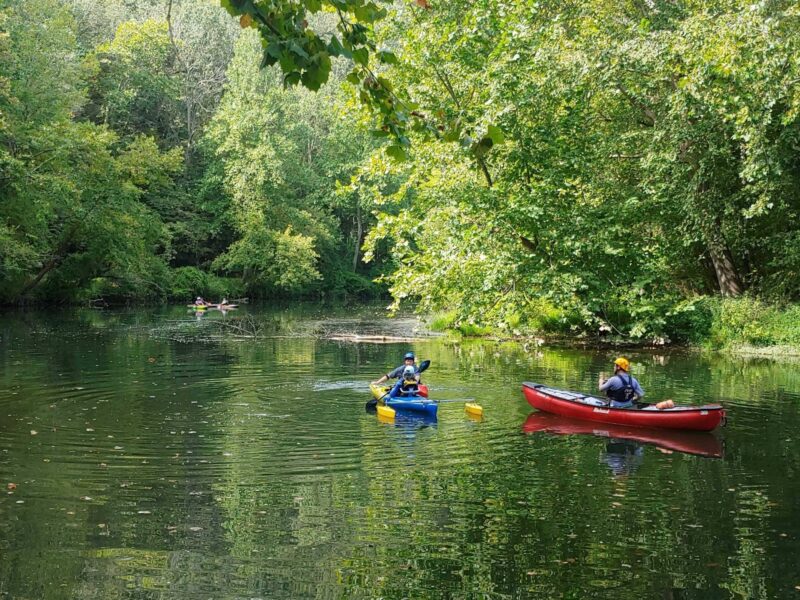How Friends of Patapsco is making the outdoors more inclusive
New efforts to improve trails and add adaptive programming are making Patapsco State Park accessible to individuals with disabilities.

Having grown up in the Baltimore area with a love for the outdoors, Bruce Clopein considers Patapsco Valley State Park to be his “oldest friend.” When he thinks of his favorite memories from childhood, they invariably include the park, whether it be fishing, hiking, building forts or “anything that really enriches a childhood.”
Now, Clopein and others on the board of Friends of Patapsco Valley State Park are working to provide those same opportunities to even more potential park goers in the area.
Located on the outskirts of Baltimore, Patapsco Valley State Park includes 16,043 acres of woods, camping spots, fishing piers and trails used for hiking, horseback and mountain biking. The park has always been a great resource for the surrounding community, but in 2014 park managers took steps to reach even more people by installing an all-sensory playground. The popularity of the new playground highlighted the need to create spaces and programs for individuals living with disabilities.
Several years later, the Friends of Patapsco Valley State Park picked up the torch and started hosting adaptive programming for adults with disabilities. After the success of the first adaptive kayaking program, they knew they needed to continue to host these kinds of events. Today, ten to 15 adaptive programs are held each year for kayaking, fishing, biking and hiking. In the future, they plan to host an event focusing on adaptive hunting.
“The reason we’re doing this work is because the park is a wonderful gift for us and we want to make sure this gift is made available for everyone, no matter what their adaptive needs may be,” said Cloppein.
Adaptive programs invite more users into the park, and they’re also how Friends of Patapsco found one of their newest board members. Chanelle Wimbish is a wheelchair user who joined one of the adaptive kayaking programs. She loved it and soon returned for a biking program and then a hiking program. After several visits, Cloppein asked her if she wanted to be on the board. Friends of Patapsco strives to make the board representative of all park users and wanted to have a person participating in the adaptive programs as a member.
One of the biggest projects that happened in the park to make adaptive programming possible was the construction of the adaptive Tall Poplar trail. Maryland State Parks used an existing mountain biking trail and made it wider and smoother for adaptive bikes. A common misconception is that adaptive park users only want short, paved trails. The mountain biking trail provides a one and a half mile-long hilly excursion for all users including those in wheelchairs.
Friends of Patapsco Valley State Park uses their events to help park goers build confidence, mentoring them from start to finish. For the adaptive biking programs, they always start in a flat, paved area so people can get used to using a recumbent bike (provided by Lancaster Recumbent), before they move to the unpaved trail and then the mountain biking trail. For many people, this is their first adaptive program and it takes a little time to get adjusted to the equipment.
Another way that the park is planning on empowering people is to give them an accurate preview of the trails before they get there. They are in the process of recording the Tall Poplar biking trail and putting it on their website so people can see if the trail fits their needs, equipment and abilities. Having a video allows users to see every part of the trail and decide if it is a good fit for them. Friends of Patapsco Valley State Park can only host so many events per year, but having the video online can encourage people to visit the park outside of an event.
Creating adaptive programs for individuals with disabilities can be an overwhelming task because of the diversity of disabilities, which might include physical, cognitive, mental or sensory impairments. Friends of Patapsco Valley State Park tries to be mindful of this wide range of disabilities. The group is currently planning an entire program for individuals with vision impairments, and have also started a partnership with the Howard County Autism Society to work with neurodivergent individuals.
At the end of the day, all of these improvements are designed to give more people access to the park, and the many benefits that come with spending time outdoors.
“I don't want to speak for everybody with disabilities, but it's actually helping me just feel really connected to nature,” said Wimbish. “Having a huge, beautiful outdoor space that I can go to and having that connection there is really important for me.”

Comments
There are no comments.
Thank you!
Your comment has been received. Before it can be published, the comment will be reviewed by our team to ensure it adheres with our rules of engagement.
Back to recent stories